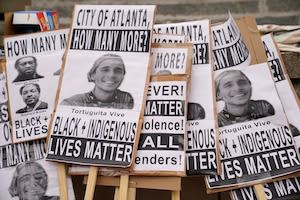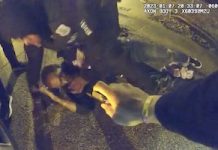
The fight to save an urban forest in Atlanta, Georgia and stop construction of a $90 million police training facility received nationwide attention when a young forest protector was killed by police on Jan. 18. Police from several local, state and federal jurisdictions violently cleared campers and tree-sitters from the forest and alleged that Manuel Paez Teran fired on them from inside a tent, wounding one officer. Police then shot Paez Teran more than a dozen times. Police officials stated the bullet that wounded the officer came from a gun registered to Paez Teran, but that there was no video of the shooting. Paez Teran espoused non-violence and his family and friends are questioning the official story. Protesters arrested have been charged with misdemeanors such as trespassing. In mid-December, six activists were charged with domestic terrorism.
The city of Atlanta leased hundreds of acres of the forest, which abuts a lower income neighborhood whose residents are largely people of color, to the Atlanta Police Foundation, or APF, for construction of what opponents call Cop City. Forty-three percent of the police departments that will train there come from outside of Georgia. A permit was issued last week to begin construction.
Between The Lines’ Melinda Tuhus spoke with Shaheen Rana, a local resident who opposes the project. Here she describes what happened after the police killing of Paez Teran, who went by his activist name Tortuguita, and opponents’ plan to continue to fight the project.
(Editor’s note: This audio version of this interview was edited to fit radio broadcast time constraints.)
SHAHEEN RANA: First and foremost, the community is feeling a heavy loss, right? Like we’re collectively grieving. This movement is a mass movement. I think it’s important to recognize that. Even if people were not sitting in the trees and living in the forest, there are literally hundreds and hundreds of people who are part of this movement. Even if we don’t all know each other intimately, we feel like a community, so the community is collectively grieving.
But at the same time the community is legitimately angry and enraged, right? It’s been a lot to deal with all of that, but because we are a community, we are also all relying on each other and supporting and caring for each other. And through all of that, I don’t want to speak for everyone, I can speak for myself and the people I’ve talked to – this hasn’t in any way weakened our resolve to stop Cop City. If anything, it’s strengthened it because Tortuguita’s death and the accompanying state repression of charging people with domestic terrorism shows exactly why it is that we’re trying to stop Cop City, why we’re fighting against this.
This is exactly what we feared – that the state’s repression tactics would get so extreme that they would kill someone just for dissenting and that’s exactly what has happened. And then they will try to suppress further dissent by trying to scare people that they will cage them and imprison them for essentially the entirety of their lives, because domestic terrorism charges come with up to 35 years in prison and that is ludicrous. Even the people that stormed the Capitol on Jan. 6, 2021 were not charged with domestic terrorism.
MELINDA TUHUS: The Stop Cop City folks are saying there are a lot of questions and are demanding an independent investigation that doesn’t involve any of the police departments that carried out the raid. Is there any update on that? Is that moving along, or is everyone just ignoring that demand?
SHAHEEN RANA: There is legal representation for the family to press forward that demand, because that is the family’s demand. And as far as an update goes, an independent autopsy revealed that Tortuguita was shot 13 times. That already is putting holes in the police’s story. We know that the police lie all the time and this incident from the beginning has had a lot of questions and concerns. Georgia State Patrol says their body cameras were not on. Why do you have body cameras if you’re not leaving them on? It just goes to show there’s no reforming this institution.
Body cameras were seen as a reform that would prevent police misconduct and police brutality and they don’t. The police just turn them off and face no consequences for that. But then they did say they have footage of the aftermath, which they have also not released.
MELINDA TUHUS: There’s going to be a week of action in Atlanta, March 4-11. If you could comment, what do you hope or what do you think might happen to try to shed light on what’s been going on?
SHAHEEN RANA: You know, weeks of action have been happening in this movement from the beginning, right? The idea behind the weeks of action is that this is a mass movement. There are many people who are against this for various reasons and they are part of the collective community but some of them are families, some of them are young people.
So the idea behind the week of action from the beginning has always been so people can feel they have ownership over this movement and put something together that feels good and right to them. So the weeks of action have had marches and protests and rallies, but they’ve also had care workshop, creative art workshops, and I think those are the things that don’t get as much media attention or talked about as much, but they’re just as important.
So when people ask us, well, what is the alternative to policing then? These weeks of action have shown us the kind of world we are trying to create. There have been conflict resolution trainings during the weeks of action. So there have been marches by the preschool network, where children have put the marches together, making signs that say things like, “We love trees! Please don’t cut down our trees!” There have been community barbecues, songwriting workshops.
It’s beautiful the way the community shows in varying ways that what we want is not money going towards tools of state violence and repression, but those resources going towards building community.
For more information on planned protests in Atlanta in March, and other actions across the U.S. in February, visit Stop Cop City at stopcop.city. Follow Defend the Atlanta Forest on Facebook at @defendatlantaforest, on linktree at @DefendAtlantaForest, Defend the Atlanta Forest on Twitter @defendATLforest and Defend the Atlanta Forest on Instagram at @defendatlantaforest.
For the best listening experience and to never miss an episode, subscribe to Between The Lines on your favorite podcast app or platform: Apple Podcasts, Spotify, Stitcher, Google Podcasts, Amazon Music, Tunein + Alexa, Castbox, Overcast, Podfriend, iHeartRadio, Castro, Pocket Casts, RSS Feed.




